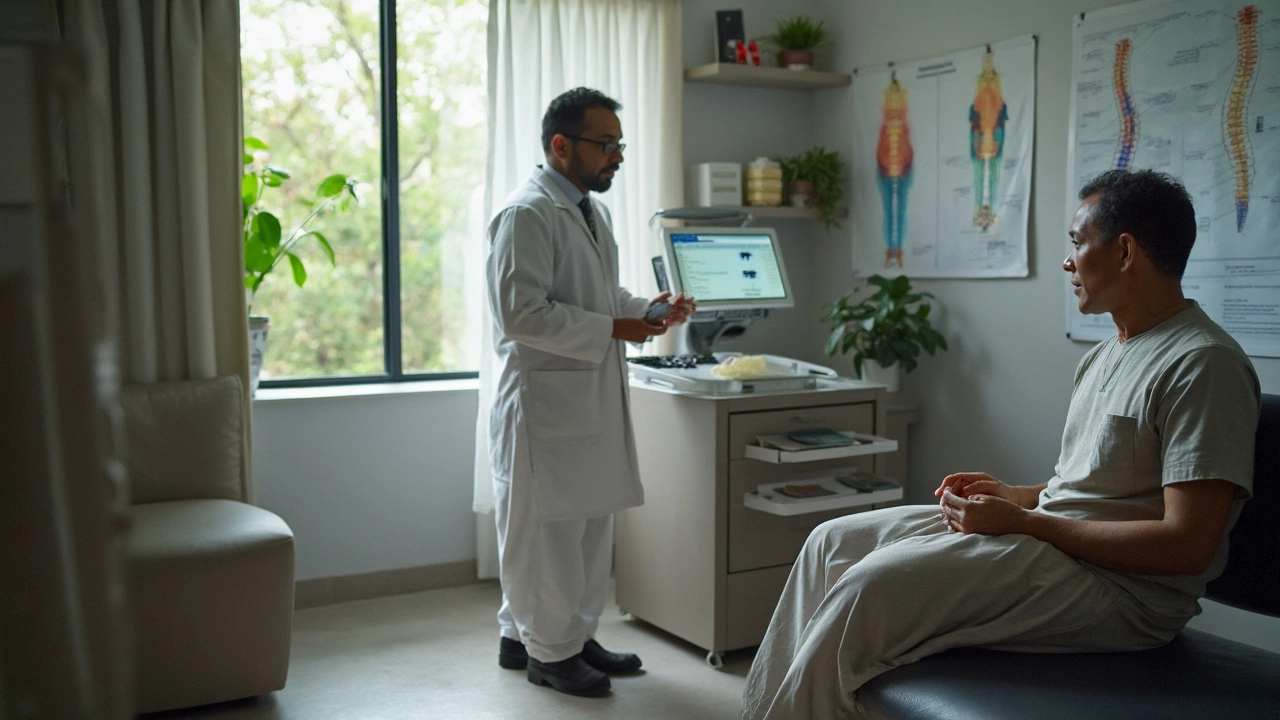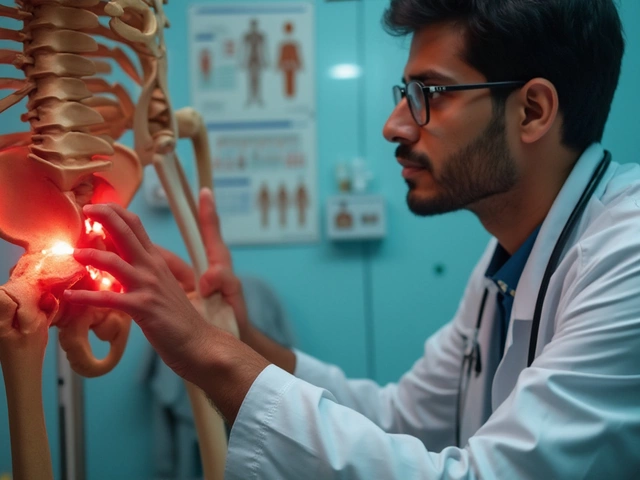Ever felt a twinge in your back and wondered if it's something serious? You're not alone. Back pain is super common, and figuring out who to see can be a bit confusing. Generally, a doctor who specializes in back issues is called a spine specialist or orthopedic doctor. But there are a few different types within this category, each with their own focus.
Understanding the different kinds of back doctors is the first step to getting the right help. We have orthopedic surgeons, who might perform surgery if needed, and non-surgical specialists like physical medicine and rehabilitation doctors, sometimes called physiatrists. They're your go-to for pain management and rehab without going under the knife.
- Types of Back Doctors
- Conditions They Treat
- When to See a Back Doctor
- Tips for Finding the Right Specialist
Types of Back Doctors
If you're trying to figure out who to see for back pain, there are a few different specialists you might consider. Let’s break it down because knowing the right doctor can make a huge difference in how you feel.
Orthopedic Surgeons
These are the heavy hitters in the world of back doctors. Orthopedic surgeons specialize in the bones, joints, and muscles, and they're trained to perform operations on the spine if necessary. Not everyone with back pain needs surgery, but if you do, these are the guys who'll get the job done.
Neurosurgeons
When it comes to the spine, neurosurgeons are also in the mix. They're experts in the nervous system and can handle complex spine surgeries. They focus on issues directly involving your spine’s nerves, so if you’ve got something like a herniated disk pressing on a nerve, they might be who you need.
Rheumatologists
These specialists are your go-to for inflammatory conditions like arthritis, which can mess with your back. Rheumatologists don't perform surgery, but they’re pros at diagnosing and treating autoimmune disorders and inflammatory diseases that can cause chronic back pain.
Physical Medicine and Rehabilitation (Physiatrists)
If surgery's not really your thing, these doctors concentrate on non-surgical treatments. They work on easing pain and improving your ability to function, using everything from physical therapy to medications.
Here's where finding the right match matters. The right back doctor can mean less pain and a faster return to doing what you love. Knowing your options is a great first step.
Conditions They Treat
Back doctors, including orthopedic specialists and spine doctors, handle an array of conditions that can cause discomfort and disrupt your lifestyle. Whether you're dealing with a sudden injury or a long-term issue, these professionals are equipped to help.
One of the most common problems they treat is back pain. This can range from something as simple as muscle spasms, which often resolve on their own with rest, to more serious conditions like herniated discs. A herniated disc happens when one of the cushions in your spine starts bulging out, sometimes pressing on nerves.
Chronic Conditions
If you've been struggling with pain for months, you might have a chronic condition like sciatica. This is when the sciatic nerve gets irritated, often causing pain that shoots down one leg. Another chronic condition involves spinal stenosis, where spaces in the spine narrow down, squeezing the nerves and causing pain or numbness.
Skeletal Abnormalities
Some folks find themselves dealing with skeletal issues like scoliosis, where the spine curves sideways, or kyphosis, where the upper back forms an exaggerated curve. These conditions can sometimes be managed with physical therapy or might require surgery if severe.
Injuries
Spinal injuries, whether from an accident or sports, are also in the realm of back specialists. They help with spine fractures, compression fractures, and dislocations, offering treatments ranging from bracing and physical therapy to surgical options.
Let's not forget osteoporosis-related issues, which can lead to weakening bones and fractures. Back doctors often work with patients to improve bone health and prevent complications.
Sometimes, they might also deal with conditions like infections and tumors in the spine, although these are rarer compared to other back issues.
| Condition | General Treatment Approach |
|---|---|
| Herniated Disc | Therapy, medication, sometimes surgery |
| Sciatica | Medications, physical therapy |
| Scoliosis | Monitoring, bracing, surgery if needed |
| Spinal Stenosis | Therapy, medication, surgery in severe cases |

When to See a Back Doctor
Knowing when to seek the expertise of a back doctor can make a huge difference in getting the right treatment in time. Not every ache requires a visit to the doctor, but some signs should not be ignored.
Persistent Pain
If your back pain has lasted more than a few weeks, it's probably time to consult someone. This could be a spine specialist who understands the complexities of back problems and can diagnose the issue accurately.
Severe or Sudden Pain
Severe pain, especially if it’s sudden, can be a red flag. Just lifting something heavy shouldn’t leave you in agonizing pain. If it does, a visit to an orthopedic hospital is warranted.
Numbness or Weakness
Sometimes pain isn’t the only concern. Numbness, tingling, or weakness in your arms or legs can indicate nerve involvement. Such symptoms should be evaluated by a specialist right away.
Loss of Bladder or Bowel Control
This is considered a medical emergency and is related to a condition called cauda equina syndrome. If you experience this, head straight to an emergency room.
Accident-Related Pain
Had a fall or been in an accident? Seek medical advice if back pain follows. Leave it unchecked, and it might turn into something more serious.
| Condition | Immediate Action |
|---|---|
| Persistent Pain (4+ weeks) | Consult Spine Specialist |
| Severe/Sudden Pain | Visit Orthopedic Hospital |
| Numbness/Weakness | See Doctor Urgently |
| Loss of Bladder/Bowel Control | Emergency Room |
In a nutshell, never ignore symptoms that are out of the ordinary. Early diagnosis is key in preventing chronic issues. Keep these tips in mind to know when it's time to call in the experts!
Tips for Finding the Right Specialist
Looking for the best back doctor can be overwhelming, but a little knowledge goes a long way in making the right choice. Here are some pointers to help you on your journey to pain relief.
1. Know Your Specialists
Understanding the types of specialists is half the battle. Orthopedic surgeons are perfect if you're facing a severe spine issue that might require surgery. But if you're not looking to go under the knife, a physiatrist could be your best bet. They focus on non-surgical back pain solutions.
2. Check Their Credentials
A quick online search can reveal a lot about the specialist's background. Verify their certifications and see if they are board-certified in their area of expertise. This ensures they have gone through rigorous training and are recognized experts in their field.
3. Consider Experience and Reviews
Experience speaks volumes. Specialists who have been treating conditions similar to yours are more likely to deliver effective results. Also, don't underestimate the power of patient reviews. Real-life experiences can give you a glimpse into their practice style and effectiveness.
4. Explore Treatment Options Available
Before committing, understand what treatments the specialist offers. Some doctors might focus more on physical therapy and pain management, while others might propose surgery. It's important to find a specialist whose treatment philosophy aligns with your comfort and needs.
5. Location and Accessibility
Frequent visits might be necessary, so consider the clinic's proximity to your home or workplace. Also, check if the orthopedic hospital offers easy access like public transport or parking facilities – it can make a big difference on a bad back day!
6. Insurance and Costs
Finally, ensure the specialist accepts your insurance plan. This might seem like a minor detail, but unexpected costs can quickly escalate. Plus, knowing your out-of-pocket expenses upfront can help in making an informed decision.
The right spine specialist can make all the difference in your journey to recovery. Don't rush the process – a little research today can save you a lot of trouble down the line.





